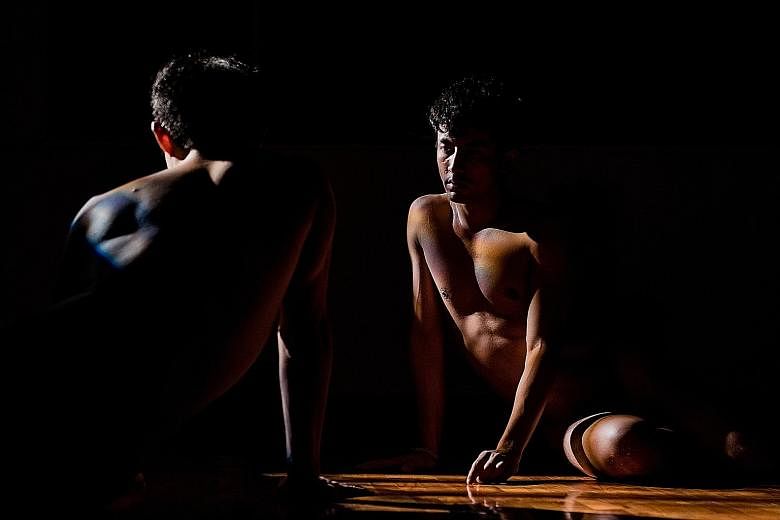REVIEW / DANCE
THE COLD THAT CREEPS IN WITH A THOUSAND CUTS
Jereh Leung
2 Kampong Kapor Road
Last Saturday
Independent dance artist Jereh Leung premiered a work that delved into the deepest, most uninhibited parts of his psyche. It has been quite a while since anyone in Singapore's contemporary dance scene bared this much of his inner self so candidly and daringly.
First shown as a 12-minute work at Maya Dance Theatre's Creations platform last year, this expanded full-length version dug even deeper than the first.
If last year's version, which was not anchored by a sado-masochistic duet, could be likened to the idea of a confrontation, then this new full-length version was the aftermath; the point in a relationship where the rot and decay had set in.
Leung and Phitthaya Phaefuang expounded on the themes of power, taboo and eroticism already present in the first version.
In the small performance space, the audience had an intimate close-up of the sensuous stretching and folding of flesh.
Power relations were played out as Leung stood still most of the time with his broad back facing the audience while the Thai dancer moved through a series of positions that suggested an erotic sense of openness and offering.
Phitthaya's movement style, which stems from his voguing background, layered the work further with ideas of gender fluidity.
Here was a beautiful male body that was no less gorgeous when negotiating femininity. The never- ending social tussles of body, sexual and identity politics diminished greatly when watching a body as confident as his move. Nothing beats seeing someone comfortable in his own skin.
Because of Leung's stillness, he seemed to be the centre Phitthaya kept relating himself back to.
The image of two bodies in states of undress was striking. At times, it looked like Phitthaya was a physical manifestation of Leung's dark fantasies. Other times, it was a glimpse into various kinds of perverted, twisted, even abusive, relationships that remained hidden from view, but were no less prevalent.
When Leung moved, he was dragging, man-handling, slapping and flinging the other dancer. Despite this, Phitthaya would crawl yearningly back to Leung's side. As this happened, this reviewer was reminded of the many tortured female protagonists of Lars Von Trier's films.
The only debatable thing was the insertion of a sound recording of a short scene from Wong Kar Wai's film, In The Mood For Love (2000), into the soundscape of the work. Thematically, this decision fit the work perfectly. However, being of one Asian cinema's most memorable movies, the weight of Wong's signature visuals proved to be a burden on Leung's work.
As the unmistakable voices of the movie, delivered by Maggie Cheung and Tony Leung Chiu Wai, came through over the dark soundscape, the imaginative breadth created by the ambiguous relationship between the two dancers narrowed.
Images of the film kept foregrounding the riveting duet between the two dancers. This was problematic and distracting because Leung's disturbingly dark creation already held its own.
Dispensing with this additional layer of sound would have made the work more suspenseful.

